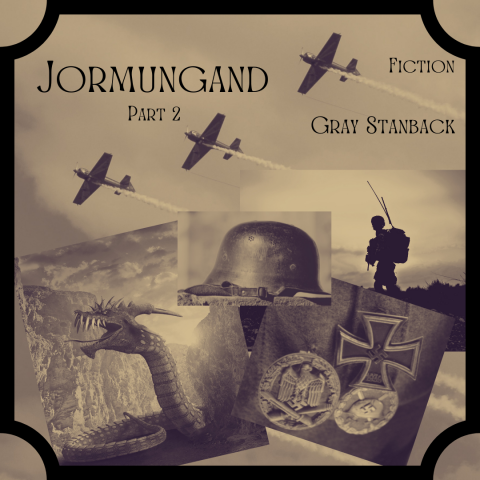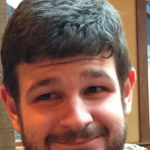Jormungand, Part 2

Image created onCanva
Read Part 1 on a previous blog post.
Pembroke lost count of how much time had passed since he had told his story to the two German soldiers, but he estimated they had been six hours, since he could see the sun beginning to creep over the eastern horizon. None of them had spoken a word in all of that time, nor had any of them fallen asleep.
When the silence was broken, however, it was not so much broken as shattered. The sound reminded Pembroke of an airplane engine, but louder, with a rhythmic beating sound to it, like the buzzing of a gigantic insect.
Pembroke had heard all manner of stories about the technological marvels Germany had created— jet fighters, rockets, and cruise missiles, all of them as bizarre as they were deadly. But as for what this aircraft was, he had no idea. Instead of wings, it had a pair of huge upright propellers on either side of its fuselage, and it landed vertically, with no need for a runway.
“Impressed?” asked Zimmerman. “The Fa 223 Drache helicopter is one of the newest additions to the Luftwaffe. Come with us.” Without a further word, Pembroke found himself frog-marched into the helicopter and sat down behind the pilots, in between Zimmerman and Dittmar.
The entire aircraft seemed to rattle as it took off, shaking Pembroke’s teeth inside his skull. He gripped the sides of his seat tightly, maintaining a stoic, unflinching expression as the helicopter rose into the air and flew off.
I’m probably the first Englishman ever to fly in one of these things, Pembroke thought to himself. If the boys back home could hear about this, they’d never believe it. Though, I do wonder what practical use they could have.
The flight lasted about half an hour in total, and there was another reverberating thud as the helicopter landed. Zimmerman prodded Pembroke with the butt of his rifle, which Pembroke understood to be a signal to climb out.
He was not entirely sure what to expect when he emerged— he had heard all about what the Nazis did in their concentration camps and their inhumane factories— but he was fairly sure that, whatever he had been expecting, it was not what he was seeing now.
They stood in front of a series of gray, concrete buildings. The largest one— the one Zimmerman and Dittmar directed Pembroke towards— stood about four stories tall, and behind it spread an expansive network of barbed wire fences. The barbed wire covered the entirety of the fences, rather than simply running along the top as it did in most fences Pembroke was familiar with. Whoever– or whatever–they were keeping in here, they certainly didn’t want it escaping.
For a split second, Pembroke wondered if he had been tricked; if Zimmerman and Dittmar knew he was a spy and were delivering him to a prisoner-of-war camp. Then, with a shudder, Pembroke realized that the barbed-wire fences were actually enclosures, and the entire facility seemed to be a holding area for some sort of animal.
Somewhere in the background, far beyond the concrete buildings, a deafening hawk-like shriek echoed. “I should have warned you,” said Dittmar. “Our animals are very difficult to control right now. We suspect it has to do with mating season. We deeply apologize for the loss of your aircraft and its crew, Oberleutnant Dieter.”
Animals? Mating season? Pembroke wanted to ask what he meant, but he held his tongue. If Zimmerman and Dittmar were going to explain this, they would do so. There was no need to ask questions that might get him in trouble.
Pembroke was escorted into the largest building. The inside was exactly how he imagined the inside of a Nazi building to look— all intimidating angles, stark grey walls, and decorative reliefs that seemed designed to terrify. At the back of the room was a desk adorned with a banner depicting an eagle with a swastika in its claws. The man sitting at the desk glared at him, a suspicious look in his eyes. The placard on his desk read General Viktor Hauptmann.
“Joachim Dieter?” he asked.
“Yes?” Pembroke said, trying his best not to show any fear.
“You must understand that you are not to speak to anyone about what you will be seeing here. It is very rare indeed that we allow others into Project Jormungand. The only reason you are here is because you saw something you should not have, something that could not have been prevented.”
Hauptmann rose from his seat and walked to a door next to his desk. He fidgeted with the handle and Pembroke wondered what he was doing, but soon realized he was using a combination to open the lock.
“Now then, Oberleutnant Dieter, come through. You have already seen one of our creations. Come and see the others.” Hesitantly, Pembroke stepped through the door, not knowing he was leaving behind the world he knew.
The door exited into the large compound of barbed-wire fences Pembroke had seen from afar when the helicopter landed. Now, however, he had a much closer look at them. The enclosures were large— about fifteen meters on a side— and they were separated by corridors. At intervals, watchtowers rose above them, with sentries and gunners peering down.
The sight of it sent a shiver down Pembroke’s spine. He had heard the horror stories about Auschwitz and Bergen-Belsen, things that even he, as an experienced spy, had no desire to see first-hand.
Fortunately, the barbed-wire cages held no human beings. Instead, they were filled with creatures Pembroke never thought he would see in his life. For a moment he thought they were large lizards, or perhaps crocodiles, but they moved with an active, agile motion quite unlike what he associated with reptiles.
Most astonishingly of all, their front legs were extended into wings, like those of a bat. They hissed and snapped at their barbed-wire cages, while guards with electric prods poked at them through the wires.
One of the animals, having apparently had enough of its torment, opened its mouth and spat a jet of fire at the men accosting it. Both of them jumped aside, narrowly escaping the flames.
“Are those. . . dragons?” Pembroke asked.
Hauptmann simply nodded.
“That’s impossible. Dragons don’t exist. Everyone knows that.” Pembroke, for the first time, allowed some of his incredulity to show.
“Correction,” said Hauptmann. “They didn’t exist. They do now. We made them.”
“So you mean they’re artificial? They’re not living creatures?” Pembroke asked, feeling a slight relief that his sense of reality was intact.
“They are definitely alive. But they are also our own creations.” Hauptmann paused, as if he was gauging Pembroke’s reaction to his statement.
Hauptmann continued. “The Jormungand Project was created with a simple purpose— to answer the question of where life comes from. So far as we know, no other country in the world has attempted such a thing. Our most important discovery, though, was the fact that all of the information in every living cell is encoded in a central structure with the shape of two spirals entwining around one another. A double helix, if you will.”
Pembroke, for his part, only became more frightened the more Hauptmann told him. He could think of only two reasons why a Nazi official would divulge such sensitive information to an outsider, and neither of them were very appealing.
If Hauptmann saw fit to tell him this much, it clearly meant that he was confident that he would not be telling anyone else. That, in turn, meant that he either intended to keep him here permanently, or that he intended to kill him. But he was here to collect information, and that meant asking questions.
“What does that have to do with—” Pembroke began.
“Be quiet!” Hauptmann stopped him. “Now, once we discovered this structure, we gave it a name— the Strings of Life. Every organism has a slightly different makeup to its Strings of Life. But once we had the ability to isolate these Strings of Life, we could combine them. Crocodile. Monitor lizard. Bat. Electric eel. And a few other choice additions, which I am not privy to tell you. The fire-breathing, we accomplished that by giving them the ability to store methane gas, which they ignite using electrical organs in their mouths.”
Pembroke stood speechless for a moment, and then muttered, “Amazing. . . turning animals into dragons. But why?”
“The same reason we do anything,” Hauptmann said with a chuckle. “Because we can, and therefore we must. As our enemies surround us from all sides— the Americans and British from the west, the Soviet hordes from the East— the Fuhrer has put out a call for ever more advanced vehicles and weapons. You saw one of them yourself in the helicopter that brought you here, a triumph of German aeronautics. The dragons of Project Jormungand are another. No other nation has the ability to bring forth new forms of life. Would you like to see them feed?”
“Feed?” asked Pembroke.
Hauptmann nodded. “Watch.”
A metal railing above the dragon enclosures began to rattle, and a door in the side of the building opened, revealing an entire beef carcass on a hook. As it passed overhead, the dragons in their pens began hissing and snapping— both at the food and one another. As Pembroke looked on, speechless, the beef carcass fell from the hook into one of the pens.
The dragon occupying the enclosure— the one nearest to Pembroke and Hauptmann— immediately attacked the food that had been dropped into it. With the fury of a starved piranha, it devoured its meal in a frenzy of scaly coils and gnashing fangs. Pembroke could not take his eyes off the gruesome spectacle as the dragon tore its food to pieces, swallowing the chunks whole without chewing them.
Again and again, the hook lowered a raw beef carcass into each enclosure. And again and again, the dragons would devour them in a truly horrific manner. Hauptmann, however, was evidently amused by it. “Interesting, no?”
“I suppose,” said Pembroke. “I mean, this is some very interesting work you’ve done, and you’ve definitely created something without any equal anywhere else in the world. But what, exactly, do you plan to do with these dragons?”
Hauptmann smirked. “The dragons you see right now are only adolescents. When they are fully grown— which we estimate should be in about six months— they will be a valuable combat asset on the Eastern Front. Burning down villages, destroying fuel depots, serving as living flamethrowers. . . the possibilities are endless.”
The panic that had been gradually welling up inside Pembroke suddenly burst forth. “You mean you’re going to turn them loose?”
Hauptmann smiled in a way that made Pembroke nervous. “Of course. You didn’t think we were going to keep these prize creations of ours locked up in cages, and not do anything practical with them, did you?”
Pembroke paused before he finally answered. “I hadn’t really given it any thought, to be honest.”
“Well then, I suppose you won’t mind answering a few questions from me,” said Hauptmann. “How did you find out about Project Jormungand?”
Read the next and final segment of Jormungand.
Need more great reads? Check out these offerings from the MockingOwl Roost contributors and staff.
- Duped – Part 1 and Part 2 – Science-Fiction
- By the Light of the Moon – Part 1, Part 2, Part 3 & Part 4 – Romance Fiction
- Like Father, Like Son – Urban Fantasy
- At the Red Door – Will & May Stories – Fiction
- The Book – General Fiction
- Squirrel – General Fiction
- Before They’re Gone – Will & May Stories – Fiction
- Smoke – Dramatic Fiction

Gray Stanback
Gray Stanback was diagnosed with autism at the age of three, and ever since has been fascinated by storytelling. Some favorite authors include Stephen King, H. G. Wells, and Japanese manga writer Mohiro Kitoh. Gray graduated Guilford College in 2016 with a major in biology and a minor in environmental studies. He has been writing original works of science fiction, fantasy, and horror since middle school.
Follow Gray on his website.





4 Comments
[…] Part 1, Part 2, & Part […]
[…] Part 2 & Part […]
[…] Part 1 and Part 2 before […]
[…] Part 1, Part 2 & Part 3 – Science […]